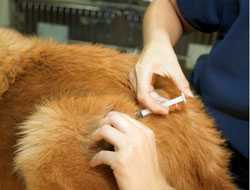Protect Your Family from Rabies
 Rabies is a dangerous virus that anyone can get if they handle or get bitten by an animal that has the disease. Protect yourself and your family from rabies: stay away from wild animals and be sure pets are vaccinated every year.
Rabies is a dangerous virus that anyone can get if they handle or get bitten by an animal that has the disease. Protect yourself and your family from rabies: stay away from wild animals and be sure pets are vaccinated every year.
Rabies is caused by a virus and can infect both people and animals. People usually get rabies when they are bitten by an animal that is sick with the disease. Early symptoms of rabies in people can include fever, headache, and weakness. As the disease gets worse, symptoms may include difficulty sleeping , anxiety, confusion, tingling sensation usually at the site of the bite, excitation, hallucinations, agitation, salivating more than usual, difficulty swallowing, and fear of water. Death usually occurs within days of the onset of symptoms.
 Avoid Wild Animals
Avoid Wild Animals
More than 90% of all animal rabies cases reported to CDC each year occur in wild animals. The main animals that get rabies include raccoons, skunks, foxes and bats.
One of the best ways to protect yourself and your family is to avoid contact with wild animals. Do not feed or handle them, even if they seem friendly. If you see a wild animal acting strangely, report it to animal control.
Keep Pets Healthy
Family pets and other domestic animals can get rabies if they are bitten by rabid wild animals. When rabies from wild animals "spills over" into domestic animals, the risk to people is increased because of our close contact with pets.
In general, pets have a higher risk of coming into contact with wild animals that may have rabies than we do. Cats, dogs and ferrets that have not gotten their rabies shots and are exposed to rabies must be quarantined for six months, or put down, because of their risk of getting rabies after the exposure.
 To help reduce this risk:
To help reduce this risk:
- Visit your veterinarian with your pet on a regular basis and keep rabies vaccinations up-to-date for all cats, ferrets, and dogs.
- Maintain control of your pets by keeping cats and ferrets indoors and keeping dogs under direct supervision when outdoors.
- Spay or neuter your pets to help reduce the number of unwanted animals that may not be properly cared for or vaccinated regularly.
- Call animal control to remove all stray animals from your neighborhood since these animals may be unvaccinated.
- Do not feed or water your pets outside and keep your garbage securely covered. These items may attract wild or stray animals.
Take Action If You Are Bitten
If you or someone in your family is exposed to a rabid animal, rabies can be prevented through a series of shots called rabies post-exposure prophylaxis (PEP).
If you are bitten by any animal (domestic or wild), immediately wash the wound well with soap and water and see a healthcare provider. Contact animal control if you are bitten by an animal, to assist in capturing the animal for observation or rabies testing.
 Be Cautious While Hiking, Camping, and Playing Outdoors
Be Cautious While Hiking, Camping, and Playing Outdoors
During the summer, many Americans love to spend time in the outdoors. Few people will ever be exposed to a rabies-suspect animal or need to see a doctor due to a potential exposure. Teach children and others never to handle live or dead wild animals, as well as unfamiliar domestic animals. Tell them to report any unusual animal behavior to an adult right away, because it could mean that the animal is very sick.
Some might have concerns about the presence of bats in locations such as camps. While bats have been known to expose people to rabies, most bats in a natural setting are not rabid and, in many camp situations, the presence or sighting of bats is common and normal.
However, precautions can be taken at camp sites and along trails to help minimize the risk of exposure to bats for your child or family members:
- When possible, prevent bats from entering campground living quarters and other occupied spaces. Animal care and wildlife conservation agencies can provide further information on "bat-proofing." Visit the following link for more information on "bat-proofing": https://www.cdc.gov/rabies/bats/index.html
- Screens or mosquito netting can provide a useful barrier against direct bat contact.
- Teach children and other camp attendees never to handle live or dead bats, as well as unfamiliar wild or domestic animals (even if they appear friendly). Tell children to report any contact or unusual animal behavior to an adult or camp official right away.
 Talk With Your Family About the Seriousness of Rabies
Talk With Your Family About the Seriousness of Rabies
While very few people die from rabies, life-threatening situations can arise when potential exposures occur and preventive measures are not undertaken. Each year 30,000 to 40,000 persons in the U.S. require PEP due to potential exposures to rabies.
To help ensure your loved ones do not face similar risks, use the above information to talk with your children and other family members about the dangers of rabies, the threat of exposure from wild animals and the things they need to do to stay healthy and rabies free.
- Page last reviewed: July 28, 2014
- Page last updated: July 28, 2014
- Content source:
- National Center for Emerging and Zoonotic Infectious Diseases, Division of High Consequence Pathogens and Pathology
- Page maintained by: Office of the Associate Director for Communication, Digital Media Branch, Division of Public Affairs




 ShareCompartir
ShareCompartir